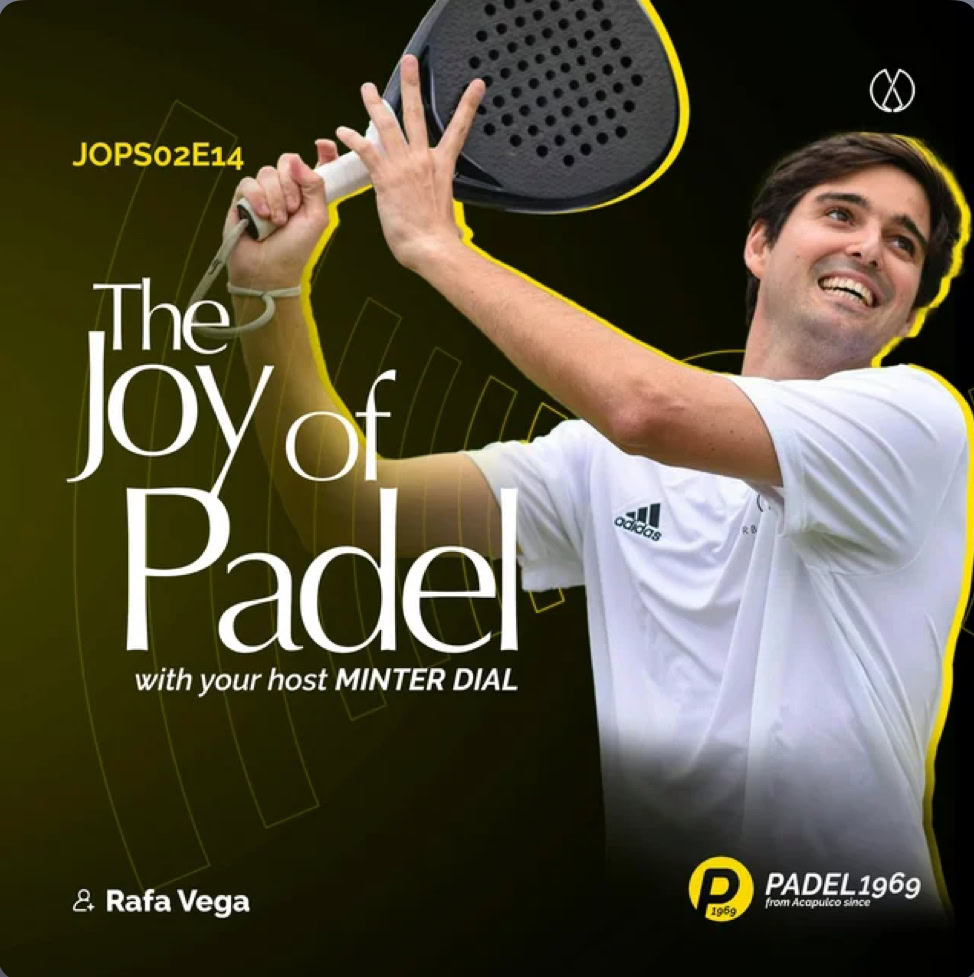The Joy of Padel, hosted by Minter Dial, continues to bring fascinating stories from the rapidly growing sport of Padel. In episode 14 of season 2, Dial sits down with Rafa Vega, Britain’s #2 ranked player and a respected coach at Harvard Club Chelsea. Their conversation reveals how a competitive tennis player transformed into one of Britain’s top Padel athletes while sharing insights about the sport’s unique appeal and challenges.
Vega’s journey to Padel started at age 15 in Spain, though he initially kept it separate from his serious tennis career. “I didn’t like mixing the two sports before tournaments,” Vega admits, explaining how the different swing mechanics would interfere with his tennis game. It wasn’t until 2018, after moving to London to improve his English, that Padel became his primary focus.
The conversation takes an interesting turn when Vega discusses the transition from tennis to Padel. His main advice to tennis players? “Tranquilo” – stay calm. Many tennis players struggle with the urge to hit too hard, making the game harder for themselves. “The glass is your friend,” Vega emphasizes, explaining how players need to work with the court’s walls rather than trying to be a goalkeeper.
One of the most intriguing parts of the discussion revolves around the evolution of professional Padel. Vega reveals how the game is becoming faster and more aggressive, particularly at the highest levels. He mentions a fascinating detail about Mexican tournaments where points lasted up to three minutes – an eternity in modern Padel. This shift has even prompted top player Sanyo Gutierrez to suggest rule changes, like extending courts or raising walls, to preserve the traditional aspects of the game.
When discussing Vega’s involvement with the Hexagon Cup, a new team-based Padel competition that attracted celebrities like Eva Longoria and soccer star Robert Lewandowski, Vega shared behind-the-scenes stories about how the sport’s unique atmosphere allows CEOs and celebrities to mix naturally with regular players – something rarely seen in other sports.
When asked about his playing style, Vega compares himself to a lion on the court, preferring aggressive play and quick points. However, he reveals his current favourite shot isn’t the powerful smash many might expect, but rather the more tactical “picada” – a shot where he goes over the top of the ball while moving backward, creating a challenging downward trajectory that opponents struggle to handle.
The conversation then shifts to the future of British Padel, where Vega identifies some surprising obstacles. Brexit has made it harder to bring in experienced coaches from Spain and Argentina, with visa requirements and costs creating unexpected barriers to the sport’s development. These challenges make the path to producing top-100 world-ranked British players more complex than many realize.
Despite these hurdles, Vega remains optimistic about Padel’s growth, particularly highlighting its accessibility. He shares an amusing anecdote about corporate events where complete beginners find themselves having fun within minutes – something he says is much harder to achieve in tennis. “If you try to do the same event with the same people on the tennis court, it’s not the same,” he explains.
Perhaps most revealing is Vega’s humble admission about his own ongoing development. Despite being one of Britain’s top players, he’s still working on improving his back-court game. This dedication to improvement, even at the highest levels, exemplifies why Padel continues to captivate players and audiences worldwide.
The episode offers unique insights into both the technical aspects of Padel and its emerging culture, making it essential listening for anyone interested in this rapidly growing sport. Whether you’re a tennis player considering the switch to Padel, a current player looking to improve, or simply curious about the sport’s evolution, Rafa Vega’s journey and insights provide valuable perspective on where Padel has been and where it’s heading.
Try out PADEL1969‘s Padel rackets and see what difference it makes to play with a premium racket.
Need advice about managing a club or installing a Padel court? Click Here to learn more.
Book a call with us if you want to build a Padel court and don’t know where to start or contact us at [email protected] for more on our advisory services.
PADEL1969 | from Acapulco since 1969.


